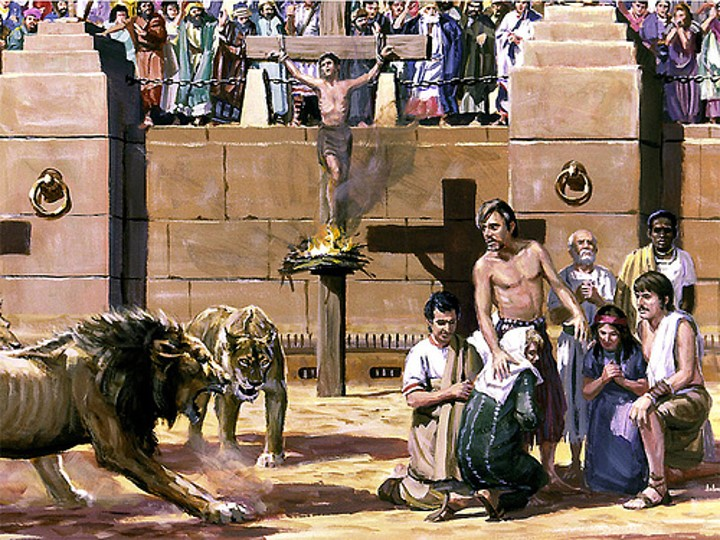Around 1799, Daniel McGinnis was exploring Oak Island, Nova Scotia when he came upon an unusual depression in the ground. He returned a short while later with two friends, John Smith & Anthony Vaughn, and they began digging. At two feet down, they struck a layer of flagstones. At 10 feet, they found a platform of oak logs, which they also found at 20 feet and 30 feet. At this point, they realized they had reached the limit of their abilities and gave up the dig.
In 1802, the Onslow Company was formed to continue the excavation. They dug as far down as 90 feet, finding the same oak log platforms every 10 feet, along with layers of charcoal, putty, and even coconut fibre not common to the region, and finally a large stone inscribed with strange symbols. The search was abandoned when the pit was flooded from an unknown source below.
Since that time numerous companies and individuals, even a U.S. president, have made further attempts to retrieve what is believed to be a massive treasure lying below Oak Island. An expedition in 1851 uncovered what is thought to be a huge drainage system on the beach of Smith’s Cove that explorers believe is connected to one or more man-made underground tunnels that are the source of the money pit’s constant flooding troubles.
To date, at least seven people have died while searching for the treasure, companies have gone bankrupt, men have spent almost their entire lives and fortunes trying to recover a lost treasure that no one knows for sure even exists.
Seeing is Believing?
Let me ask you a question: Did any of the people who searched for treasure on Oak Island first see it with their own eyes? If the answer to that is “no” – and it is “no” – then why were they so convinced that it was there? I mean, surely, in our age of science and reason no one would be so foolish as to believe in something that they can’t first see for themselves, right?
“Show me the evidence!” Don’t people need concrete, undeniable proof before investing their time and energy into something? But here we see a large number of people whose belief in something they couldn’t see was so great that for many of them it literally changed the course of their lives. And they demonstrated that belief through action.
This begs the question: “Is faith blind?” This is what is often said about Christian faith, or religious faith in general – that it’s not based on facts or evidence, as if faith is the exact opposite of true science. And unfortunately, when asked to define faith, Christians often fall into this trap and make it sound as if faith is just a feeling and has little to do with anything concrete.
“God said it, and I believe it!” While for the Christian that statement is true, that’s hardly convincing for someone who doesn’t believe in God already. To a secular person this sounds foolish, even ridiculous – a blind leap in the dark. So what is the true definition of faith, as described in the Bible?
Defining Faith
The Bible defines faith in the following way:
Now faith is the substance of things hoped for, the evidence of things not seen. Hebrews 11:1
“Faith” is translated from the original Greek noun, Pistis, which is derived from the verb Peithō, meaning “to convince or persuade”.
In order for someone to become convinced, they would first have to witness or experience something very compelling – much in the same way that a scientist examines data and evidence before being persuaded that a certain hypothesis is accurate. That doesn’t sound blind to me!
Something else I noticed: why does this verse have two parts and not just one? Let’s look at these parts separately.
Faith is the substance of things hoped for
The word “substance” is here translated from the Greek word, Hypostasi, which means: “a setting or placing under, foundation, confidence, assurance, firm trust”. So another way to say this is, “Faith is a firm foundation or strong confidence of things you fully expect to happen”. That doesn’t sound like a fragile belief based on fantasy and wishful thinking.
Let’s look at the next part…
Faith is the evidence of things not seen
What is this really saying? How can you have evidence for something invisible? Well, let me ask you this: Can you physically see a person’s “beliefs”? I mean the actual belief itself – the concept – an idea that a person has in their mind which they think is true.
No, of course you can’t see it. It’s invisible. But what can you see? You can see the evidence of that belief.

Look at the people in this painting. They’re dying for something: they’re dying for their beliefs. They are willing to sacrifice life itself for an “idea” – something you can’t see. But it’s their actions that are the compelling part. That’s the evidence. That’s what is causing you to think right now: Those people really believe in something. Because you see the evidence.
Faith, then, is trust demonstrated by action.
But how do you come to trust in something, or someone? How do you get to the point where you can say, “I have faith” (and mean it)?
When Jesus was here on earth, one day He asked a question:
When the Son of Man comes, will He really find faith on the earth? Luke 18:6
God already knows the future. So He knows the answer to this question. That means that Jesus did not say this because He was wondering about this. He said it because He wants to draw your attention to this.
Apparently, faith matters to God. So much so, that it is something Jesus is specifically looking for when He comes again. He wants to see the evidence – do people really trust Him, and is that demonstrated by the decisions they make (also known as “their works”)?
In the Beginning
I want us to look at the beginning of the story – Creation. In this story, God says something, and then it literally happens.
And God said, Let there be light: and there was light. Genesis 1:3
According to the Bible, how much time passed between the moment God finished saying those words and the thing actually coming into existence? It doesn’t say. In fact, it doesn’t indicate that any time passed at all. As far as timing goes, it’s clear that each thing occurred on a single day, but it does not say that it took an entire day for the thing to happen. In other words, God spoke, and the results were immediate.
Imagine if everything you said… happened.
In fact, imagine if your words became reality instantly. That’s a neat skill to have. If I had that ability, I could say, “Everyone is debt-free” and it would be true – right away. The banks and credit card companies would be wondering what just happened.
But that could be dangerous too. If I said the wrong thing, or spoke some words carelessly, I could cause a lot of damage. If I said, “That guy is a real hoot!” I might accidentally turn him into an owl.

So, I’m glad that the only One who has this ability is God – because God is good, and every word He says is also good. In fact, that was His overall impression at the end of each day during the creation week: “This looks good”.
Adam
Something remarkable happens in Genesis 2. We actually see, for the first time, a demonstration of faith in God.
And the Lord God formed man of the dust of the ground, and breathed into his nostrils the breath of life; and man became a living being. Genesis 2:7
Imagine being Adam – opening your eyes for the first time and seeing this majestic Being called God standing over you, telling you that He had just finished creating you; that He is your Creator.
How would you know that what God said to you is true? Did Adam actually see God create anything? Was he present when God created light, sky, dry land, seas, vegetation, sun, moon, and stars, fish, birds, cattle, and every creeping thing? No.
Would it not have made more sense for God to create Adam first, and then let him experience God’s creative power in action with all of his senses? Then Adam could know for certain the power of God, and that He is the Creator of all things. He would have witnessed it with his own eyes after all!
But God chose not to do this, and He did not regret this order of things. In fact, He called it “very good”. Genesis 1:31
Eve
And the Lord God caused a deep sleep to fall on Adam, and he slept; and He took one of his ribs, and closed up the flesh in its place. Then the rib which the Lord God had taken from man He made into a woman, and He brought her to the man. And Adam said: “This is now bone of my bones and flesh of my flesh; She shall be called Woman, because she was taken out of Man.” Genesis 2:21-23
What?! Again? Why did God put Adam to sleep when He made Eve? This would have been a perfect opportunity for Adam to see God’s creative power in action. Then he would have indisputable proof that God was truly the Creator.
But no, God wanted Adam to believe His words without seeing – He wanted him to have faith.
Adam evaluated the evidence – a missing rib, a beautiful woman, and a very powerful Being telling him “I did this” – and Adam chose to believe God’s word. Then he gave a testimony affirming his faith in what God had done.
After Jesus rose from the dead, He appeared to His disciples one day and the infamously named “doubting Thomas” was there. This is what Jesus said to him:
Thomas, because you have seen Me, you have believed. Blessed are those who have not seen and yet have believed. John 20:29
Why is believing in what God says, without seeing, so much better than believing it because we have already seen? Maybe because the very nature of existence itself requires a constant exercise of faith.
An Airplane Trip

Let’s take an airplane trip. In fact, I’ll cheat a little here and say you’re already at the airport walking towards the plane. You get to the stairway ramp and ask the attendant, “Are these stairs safe to climb?”
The attendant gives you an odd look and then says, “Of course they are!”
“Well, I want to know who built these stairs? In fact, were they qualified to build stairs? Did they get a certification in stair building? And even if they did, how do I know they didn’t just do a sloppy job when building these stairs? What if I’m halfway up the ramp and it collapses under my weight? I could be seriously injured! I want to see a video of these stairs being constructed. And I want to see a list of the materials used along with the engineering diagrams.”
The attendant thinks you’ve lost your mind at this point. “Look, buddy, these stairs are safe. Their made of solid steel!”
To this you respond, “Yes, but just because solid steel was safe before doesn’t mean it’s safe today. What if the laws of physics are different today than they were yesterday. Just because something was constant in the past doesn’t mean it will continue to be so. Maybe steel is incredibly weak today.”
At this point a stewardess appears at the airplane door and shouts down to you: “You’re holding up this flight! Are you going to get on the plane or not?”
“Well, who’s flying this plane?” you ask. “I haven’t seen the pilots. Maybe there isn’t even a pilot. Or maybe the pilots don’t even know how to fly this plane and just snuck on. How do I know when I get to the top of the stairs that you won’t just thrown me back down because you’re angry? And what about this plane? How much fuel does it have? What if we run out of fuel mid-flight? What if the engineers who designed this plane made a mistake and it blows up while I’m on it? What if I get on this flight but it’s actually the wrong flight and I end up in North Korea? What if… what if… what if…”
Do you see where this would lead?
Without faith, you would never do anything. Nothing at all.
You wouldn’t put food in your mouth because how do you know that it’s not contaminated? You wouldn’t even breathe because maybe someone released a poisonous gas into the air. Or maybe breathing actually isn’t good for you – it’s just a trick! Maybe not breathing is actually what you’re supposed to do.
Without faith, you would die.
Every day you exercise faith in little things and big things. In the majority of cases, you actually know very little or even nothing about those things. You assume. You trust. Someone said such and such, and you believe them, even if you’ve never met before. You trust that when you put your foot on the brake, the car will indeed slow down. If you didn’t believe that, you would never get into a car.
If you didn’t have faith, you would never attempt to live.
But the kind of faith that God is looking for especially, is not the kind of trust that you put in planes or cars or stairs or supposed “experts”. The kind He is looking for, is the faith that you put in His word.
Why Can’t I Do “X”?

A couple of years ago, I had some visitors over to my house for lunch. One of them was a young person, and as we were talking together they asked me a though-provoking question: “Why can’t I do ‘X’?”
I’m not going to tell you what ‘X’ was because it is irrelevant to this story, except for the fact that ‘X’ is a sin according to the Bible. But this young person was not convinced that it was really that bad. They looked at the risks involved in doing this activity, and didn’t think it was a big deal. They couldn’t see any major consequences. In fact, it sounded to them like a lot of fun. So why not?
I thought for a moment, and then answered: “Do you think you’re wiser than God?” They didn’t seem to be very impressed with this response, and unfortunately the conversation didn’t continue further.
But I want to ask you some questions:
- Does God love you?
- Does God know the end from the beginning?
- Is God good?
- Will He give good things to His children?
- Does He want to give you the desires of your heart?
- Is God wiser than man?
The answer to all six of these questions can be found in the Bible. And the answer is “yes” in every case. So now, if God says “Don’t do this” and you decide to do it anyways, what does that say about you? It says that you do not believe the answer is “yes” to at least one of those six questions. It means that you don’t have faith that what He says is true. And your actions will show this, because actions reveal what you really believe.
Faith and Obedience
But without faith it is impossible to please Him, for he who comes to God must believe that He is, and that He is a rewarder of those who diligently seek Him. Hebrews 11:6
Think about that for a minute. If you don’t have faith in God, if you don’t trust Him, you won’t be able to please Him. That’s what it says. Why? Because you won’t obey Him.
Once you get this, it will transform your understanding of what true obedience is.
If you have faith in God, you will obey Him. Obedience is the natural result of faith. It is faith in action. It is the “works” part, the “evidence” part of faith. And it’s not artificially manufactured. You won’t have to try hard to obey. If you really trust God, you will obey. It won’t be hard. It won’t be a burden to do what’s right.
The reason people are sinning all the time in this world is because they don’t actually trust God. They think He’s holding out on them – withholding good stuff. After all, didn’t the serpent in the garden of Eden say so?
You will not surely die. For God knows that in the day you eat of it your eyes will be opened, and you will be like God, knowing good and evil. Genesis 3:4-6
There it is. There’s the lie: God said something, but it’s not true. And not only that, He’s also keeping back things from you. Good things. So you can’t trust Him anymore, can you?
A word of advice: Don’t trust serpents that talk.
It’s fascinating that God’s word makes the following statement, and the context of this verse is in regards to eating something forbidden (just like what happened in Eden):
But he who doubts is condemned if he eats, because he does not eat from faith; for whatever is not from faith is sin. Romans 14:23
Did you catch that? Sin is the result of no longer trusting God. Sin is what happens when faith is replaced with unbelief.
So what is the secret to obedience? Faith. Developing a total trust in God’s word.
The 10 Commandments

You may recognize these – the 10 commandments. But I want to focus on the part of the commandments that is often not recited when we list them out: The very first line, even before we get to the “Thou shalt nots”.
I am the Lord your God, who brought you out of the land of Egypt, out of the house of bondage. Exodus 20:2
Do you believe that? Do you believe that He is the Lord your God, and that He has set you free from your sins? That you are no longer a slave to sin? That the devil is no longer your master? If you don’t believe that, then any attempt you make to “obey” the 10 commandments that follow will be done in your own strength, and you will utterly fail, over and over again.
Because obedience is the result of faith.
But if you believe that promise, written with God’s own hand (and God cannot lie because everything He says… happens! Just like when He said, “Let there be light”), then the 10 commandments that follow will become 10 promises.
God says, Because you believe My word, you shall no longer have any Gods before Me. Because you trust Me, you will honour your father and mother. Because you have faith in Me, you will not steal. Because you love Me, and you believe that I love you, you shall keep My commandments.
These are His promises. They’re not just commandments. They’re promises that can be a reality for you… if you choose to believe Him.
Faith is the Victory
This is true obedience. And it’s the only kind that actually works – because it’s not powered by human weakness. It’s powered by the Holy Spirit living in you, by God’s Word manifested in your flesh. This is why King David wrote:
Your word I have hidden in my heart, That I might not sin against You. Psalm 119:11
Because
faith comes by hearing, and hearing by the word of God. Romans 10:17
So here’s how it works then:
- If you want to live a victorious Christian life and enjoy freedom from sin, then you need faith.
- How do you get faith? By filling your heart and mind with God’s word. You need to pray and study the Bible. As you do this, God will transform the way you think. He will renew your mind and increase your faith. The devil’s lies that you have so long believed will one by one be thrown down, and replaced with the truth – that God can be trusted. That His promises are sure.
And we have this promise:
Now to Him who is able to keep you from stumbling, and to present you faultless before the presence of His glory with exceeding joy. Jude 24
Do you have faith that God can do that for you? That He can actually keep you from stumbling into sin over and over? That He can literally set you free? He can!

If you don’t believe, then pray and start reading. Start filling your mind with His promises. Start filling your mind with the truth. Because the truth shall set you free.
Faith is the victory. Faith is the victory!
For whatsoever is born of God overcometh the world: and this is the victory that overcometh the world, even our faith. 1 John 5:4

